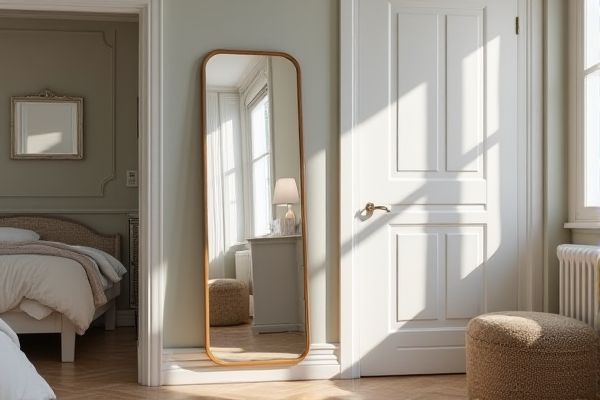
A closet mirror offers a sleek, space-saving option that blends seamlessly with your wardrobe, while an over-the-door mirror provides convenience by maximizing unused door space without installation. Discover which mirror style best fits your room's layout and personal needs by reading the full article.
Table of Comparison
| Feature | Closet Mirror | Over-the-Door Mirror |
|---|---|---|
| Installation | Mounted inside or on closet door, requires screws or adhesive | Hangs over door using hooks, no tools needed |
| Space Saving | Maximizes interior closet space | Uses door space without altering door structure |
| Mirror Size | Typically full-length, customized size available | Usually full-length, standard sizes |
| Stability | Firmly fixed, less movement | May shift or sway with door movement |
| Appearance | Integrated look inside closet | Visible on door, adds decor element |
| Cost | Generally higher due to installation | Lower cost, easy to install |
| Damage Risk | Potential for screw holes or adhesive marks | No permanent holes, minimal door damage |
| Portability | Less portable once installed | Highly portable, easy to move |
Closet Mirror vs Over-the-Door Mirror: Key Differences
Closet mirrors typically offer a full-length reflection integrated into the door or wall, providing a sleek, space-saving solution ideal for personalized dressing areas. Over-the-door mirrors hang securely on standard door frames, allowing for easy installation and portability without permanent fixtures. Choosing the right option depends on your available space, installation preferences, and how seamlessly you want the mirror to blend into your room's design.
Pros and Cons of Closet Mirrors
Closet mirrors offer a sleek and integrated look, saving space by being built directly onto or inside the closet door, which maintains a clean bedroom aesthetic. However, they can be limited in size and flexibility compared to over-the-door mirrors, which are easy to install, movable, and often provide a full-length reflection. Closet mirrors may require professional installation and can be less accessible if the closet is frequently used or cluttered, impacting convenience.
Pros and Cons of Over-the-Door Mirrors
Over-the-door mirrors offer space-saving solutions by utilizing existing door space without requiring extra wall area, making them ideal for small rooms or closets. They provide easy installation and portability but may cause door alignment issues or damage with frequent use. Your choice depends on balancing convenience and potential wear on door hinges.
Installation: Closet Mirror vs Over-the-Door Mirror
Installing a closet mirror typically involves mounting it securely on the inside of a closet door or wall, requiring screws and tools for a more permanent setup. An over-the-door mirror offers a simpler, tool-free installation by hanging directly over the door, making it easy to move or remove without damage. Your choice depends on whether you prefer a fixed mirror for long-term use or a flexible, easily adjustable option.
Space Efficiency and Room Aesthetics
Closet mirrors offer superior space efficiency by utilizing existing storage areas without occupying additional wall space, ideal for small rooms. Over-the-door mirrors enhance room aesthetics by providing a sleek, full-length reflective surface that complements door frames and can visually expand the room's depth. Both options maximize functionality while maintaining clean, uncluttered living spaces.
Durability and Maintenance Comparison
Closet mirrors typically offer greater durability due to their fixed installation and robust frame construction, reducing the risk of damage from frequent handling. Over-the-door mirrors, while convenient and portable, often experience more wear and tear from constant movement and hanging, which can lead to frame loosening or mirror detachment over time. Maintenance for closet mirrors involves occasional cleaning and frame checks, whereas over-the-door mirrors require regular inspection of hanging hardware to ensure secure attachment and prevent accidents.
Best Uses for Closet Mirrors
Closet mirrors offer the advantage of being integrated into your storage space, making them ideal for small rooms where maximizing square footage is crucial. They provide a full-length reflection perfect for outfit checks while dressing directly inside the closet, saving you time and effort. Your closet mirror enhances functionality by combining storage and dressing areas, optimizing daily routines efficiently.
Ideal Situations for Over-the-Door Mirrors
Over-the-door mirrors are ideal for small spaces or rooms lacking wall space, offering a convenient full-length reflection without installation. They provide easy mobility and can be repositioned effortlessly, making them perfect for renters or dormitory setups. This mirror type maximizes space efficiency by utilizing the back of doors, ideal for apartments or rooms with limited square footage.
Price Comparison: Closet Mirror vs Over-the-Door Mirror
Closet mirrors generally cost more due to custom sizing and installation requirements, with prices ranging from $100 to $300, depending on materials and design complexity. Over-the-door mirrors are budget-friendly options, typically priced between $20 and $80, offering easy installation without professional help. The price difference largely depends on whether a permanent fixture or a temporary, movable mirror is preferred.
How to Choose the Right Mirror for Your Space
Choosing the right mirror depends on your room size, available wall space, and how you intend to use it. Closet mirrors provide a sleek, integrated look ideal for small or walk-in closets, maximizing space without cluttering walls. Over-the-door mirrors offer versatility and easy installation, perfect for renters or rooms with limited wall area, ensuring Your space remains functional and stylish.
 homyna.com
homyna.com